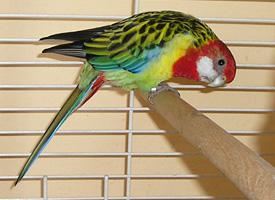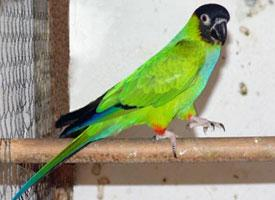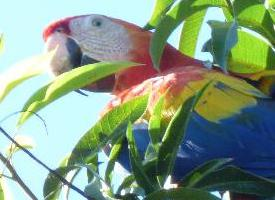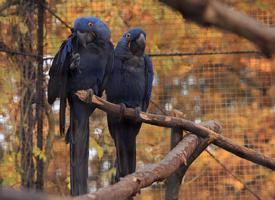
Súlyok és méretek
| Hossz | 30 cm |
|---|
Állatleírás
The Eastern rosella (Platycercus eximius), a strikingly vibrant member of the parrot family, is a bird that captivates with its brilliant plumage and graceful demeanor. Native to southeast Australia and introduced to New Zealand, this medium-sized parrot embodies a kaleidoscope of colors that makes it a favorite among bird enthusiasts and a spectacular sight in its natural habitat.Measuring approximately 30 cm in length, the Eastern rosella boasts a robust and compact body structure, with a relatively broad tail and strong, curved beak characteristic of parrot species. The bird's plumage is a dazzling display of color. Its head gleams with a deep crimson that extends down to the breast, contrasting sharply with white cheek patches that add a touch of elegance to its facial features. The back and wings are primarily black, adorned with green edging on the feathers, which gives the bird a shimmering effect when viewed in sunlight. The most distinctive feature, perhaps, is the vibrant yellow belly, which seamlessly transitions into a red undertone as it merges with the crimson chest. The tail is a mix of green and blue, providing a splendid finale to the bird's color palette.
Eastern rosellas are diurnal, starting their day at dawn with melodious calls that resonate through open forests, woodlands, and even urban parks and gardens where they are often found. These birds are as versatile in their habitats as they are in their diet, feeding on a variety of seeds, fruits, buds, flowers, and insects. This adaptability has allowed them to thrive in a range of environments, although they maintain a preference for areas where food sources are abundant.
Social behavior in Eastern rosellas can vary; they are often seen in pairs or small family groups, and outside of the breeding season, may congregate in larger flocks. Their social interactions are a delightful spectacle, characterized by gentle chirps and an array of other vocalizations, along with a display of their vibrant plumage.
Breeding season brings a particular focus to their behavior. The Eastern rosella typically nests in hollows of trees, lining the cavity with wood shavings where the female lays 4 to 9 eggs. Both parents partake in the incubation process, which lasts about 20 days, and in feeding the chicks until they are ready to fledge. The care and attention to their offspring are testament to the birds' strong familial bonds.
Despite their beauty and adaptability, Eastern rosellas face challenges from habitat loss and the pet trade. However, they are currently classified as of Least Concern by the International Union for Conservation of Nature (IUCN), indicating a stable population. Conservation efforts and responsible pet ownership are crucial to ensuring that these colorful parrots continue to thrive in the wild and captivate future generations with their vivid splendor and lively character.
In summary, the Eastern rosella is not just a bird of extraordinary beauty but also a symbol of nature's vivid palette. Its presence enriches the landscapes of Australia and New Zealand, adding a burst of color and vitality that underscores the importance of biodiversity and conservation.
Hasonló állatok
Új állatfotók
Top 10 állat
- Dolphin gull (Leucophaeus scoresbii)
- Diana monkey (Cercopithecus diana)
- Japanese macaque (Macaca fuscata)
- Galápagos tortoise (Geochelone nigra complex)
- Stone loach (Barbatula barbatula)
- Moustached guenon (Cercopithecus cephus)
- Russian tortoise (Testudo horsfieldii)
- Common house mosquito (Culex pipiens)
- Japanese spider crab (Macrocheira kaempferi)
- Giant peacock moth (Saturnia pyri)


